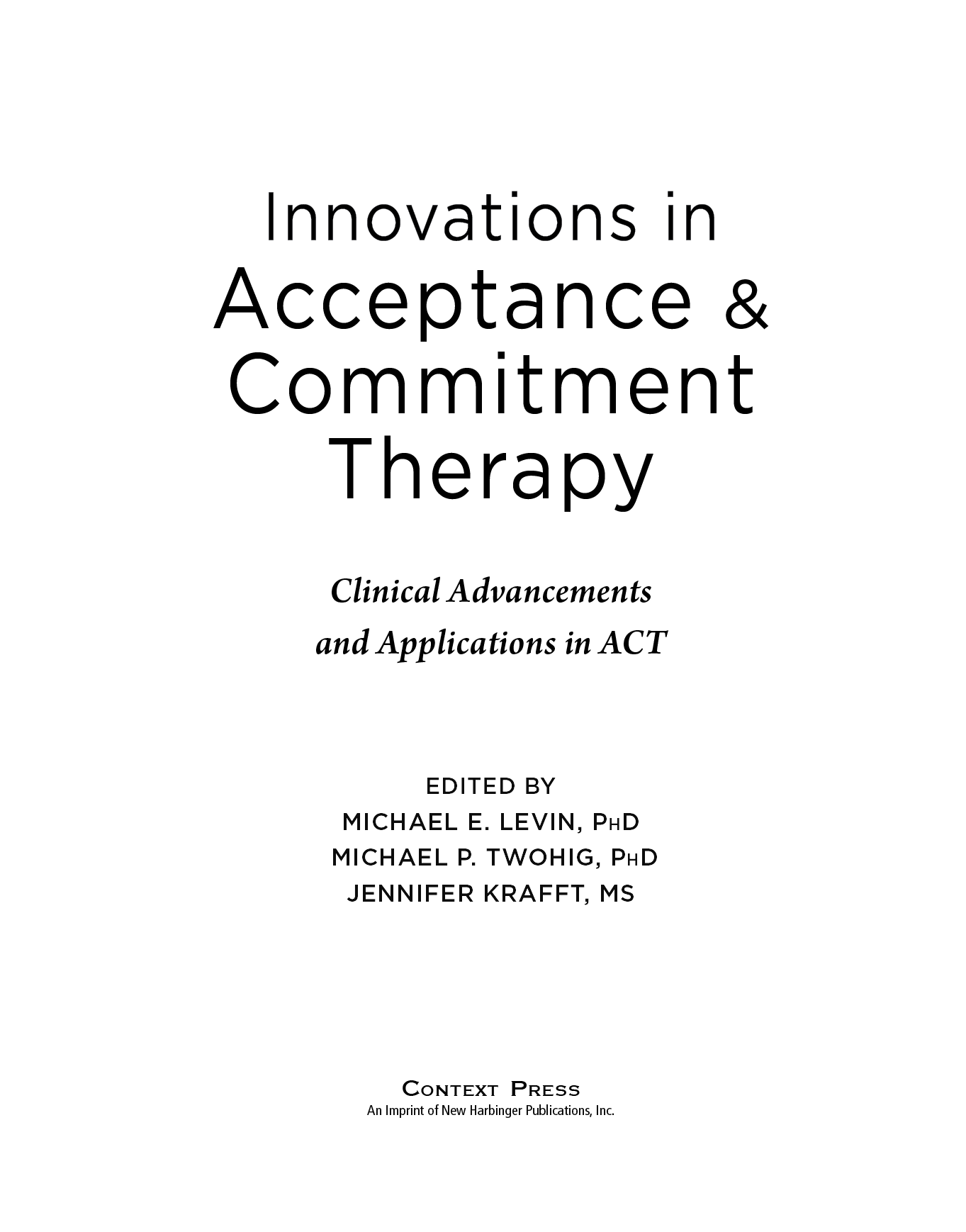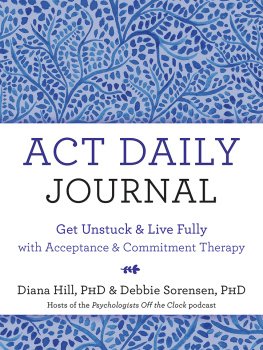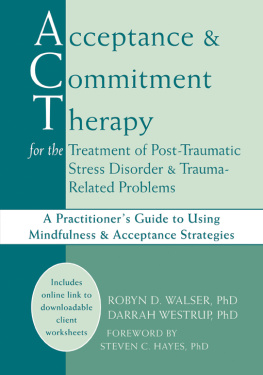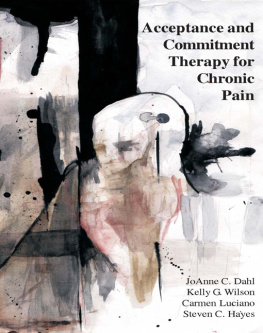Michael E. Levin - Innovations in Acceptance and Commitment Therapy: Clinical Advancements and Applications in ACT
Here you can read online Michael E. Levin - Innovations in Acceptance and Commitment Therapy: Clinical Advancements and Applications in ACT full text of the book (entire story) in english for free. Download pdf and epub, get meaning, cover and reviews about this ebook. year: 2020, genre: Romance novel. Description of the work, (preface) as well as reviews are available. Best literature library LitArk.com created for fans of good reading and offers a wide selection of genres:
Romance novel
Science fiction
Adventure
Detective
Science
History
Home and family
Prose
Art
Politics
Computer
Non-fiction
Religion
Business
Children
Humor
Choose a favorite category and find really read worthwhile books. Enjoy immersion in the world of imagination, feel the emotions of the characters or learn something new for yourself, make an fascinating discovery.
- Book:Innovations in Acceptance and Commitment Therapy: Clinical Advancements and Applications in ACT
- Author:
- Genre:
- Year:2020
- Rating:4 / 5
- Favourites:Add to favourites
- Your mark:
- 80
- 1
- 2
- 3
- 4
- 5
Innovations in Acceptance and Commitment Therapy: Clinical Advancements and Applications in ACT: summary, description and annotation
We offer to read an annotation, description, summary or preface (depends on what the author of the book "Innovations in Acceptance and Commitment Therapy: Clinical Advancements and Applications in ACT" wrote himself). If you haven't found the necessary information about the book — write in the comments, we will try to find it.
Michael E. Levin: author's other books
Who wrote Innovations in Acceptance and Commitment Therapy: Clinical Advancements and Applications in ACT? Find out the surname, the name of the author of the book and a list of all author's works by series.
Innovations in Acceptance and Commitment Therapy: Clinical Advancements and Applications in ACT — read online for free the complete book (whole text) full work
Below is the text of the book, divided by pages. System saving the place of the last page read, allows you to conveniently read the book "Innovations in Acceptance and Commitment Therapy: Clinical Advancements and Applications in ACT" online for free, without having to search again every time where you left off. Put a bookmark, and you can go to the page where you finished reading at any time.
Font size:
Interval:
Bookmark:

If youre anything like me, its hard to keep up with the constant stream of research in acceptance and commitment therapy (ACT), as the model continually grows, adapts, and changes. So, if you want to get up to speed on the latest innovative research in ACT, and discover the exciting new directions ACT is heading in, this book is for you!
Russ Harris , author of ACT Made Simple and The Happiness Trap
This book is an example of ACT unchained. For many reasons, ACT has often been presented as a psychotherapy model among models. This book, reflecting the basic science perspective that ACT came from, is pointing toward something much more comprehensive: basic principles of effective psychological treatment.
Niklas Trneke, MD , author of Learning RFT and Metaphor in Practice
It takes a very talented group of editors to bring together the widely recognized thought leaders in an area of applied clinical science, and to harness the power and vision of such brilliant minds. Levin, Twohig, and Krafft have succeeded in accomplishing this difficult feat. The reader of Innovations in Acceptance and Commitment Therapy will quickly realize that there is something very special about this book. This book has the best of both worlds: An extremely broad and interesting array of highly relevant topics that are well written, comprehensive, and thought provoking. If I were to recommend one book that would instantly get the reader up to speed on the most recent developments in ACT specifically, and the burgeoning field of contextual behavioral science (CBS) more broadly, this would be it! Highly recommended!
Kirk Strosahl, PhD , cofounder of ACT, and coauthor of Learning ACT in Psychiatry and The Mindfulness and Acceptance Workbook for Depression
Innovations in Acceptance and Commitment Therapy is essential reading for all professionals who want to use the wisdom of ACT ideas in their work. The book provides cutting-edge and up-to-date coverage of ACT theoretical concepts and practical innovations for practitioners across all settings, such as individual or group psychotherapy, counseling, coaching, community or organizational interventions, etc. Comprising an excellent collection of chapters from leading authors in the field, this is a must-read for those looking to learn about new ACT innovations.
Louise McHugh, PhD , associate professor at University College Dublin, coauthor of A Contextual Behavioral Guide to the Self , peer-reviewed ACT trainer, and fellow of the Association for Contextual Behavioral Science
Innovations in Acceptance and Commitment Therapy provides an excellent sampling of ACT interventions across clinical issues, populations, and levels of care; and demonstrates how ACT represents a process-based therapy. Its exciting to see how far weve advanced in CBS! This book integrates contemporary applied behavior theory into clinical applications, providing not only an overview of current research, but also clinical tools for immediate use. Thus, it will be a very useful state of the union for clinicians and researchers alike.
Lisa W. Coyne, PhD , assistant professor in the department of psychiatry at Harvard Medical School; founder of the New England Center for OCD and Anxiety in Boston, MA; and coauthor of Acceptance and Commitment Therapy
Innovations in Acceptance and Commitment Therapy not only provides a compendium of up-to-date advances in the intervention, it contextualizes the evolution of ACT and the importance of refining and studying clinical application with varied populations. The research detailed here in conjunction with real-world strategies to improve clients lives makes it one of the most important books for clinicians, researchers, and teachers to read. Fully digesting the book means learning how to bring new and interesting ACT applications into your work as a mental health researcher and provider. This book not only catches the reader up on innovations, it inspires readers to continue the work of developing this incredible intervention.
Robyn D. Walser, PhD , codirector of Bay Area Trauma Recovery Clinic; assistant professor at the University of California, Berkeley; author of The Heart of ACT ; and coauthor of Learning ACT and The Mindful Couple

Publishers Note
This publication is designed to provide accurate and authoritative information in regard to the subject matter covered. It is sold with the understanding that the publisher is not engaged in rendering psychological, financial, legal, or other professional services. If expert assistance or counseling is needed, the services of a competent professional should be sought.
Distributed in Canada by Raincoast Books
Copyright 2020 by Michael Levin, Michael Twohig, and Jennifer Krafft
Context Press
An imprint of New Harbinger Publications, Inc.
5674 Shattuck Avenue
Oakland, CA 94609
www.newharbinger.com
Cover design by Amy Shoup
Acquired by Catharine Meyers
Edited by Rona Bernstein
Indexed by James Minkin
All Rights Reserved
Library of Congress Cataloging-in-Publication Data on file
We dedicate this book to the Association for Contextual Behavioral Science, whose curious, open, and supportive community facilitated these advances.
Contents
Foreword:
The Rise of Process-Based Therapy Research: Returning to Our Roots
Kelly G. Wilson
Professor, University of Mississippi
Founder, OneLife, LLC
At first glance, this book appears to be an exploration of the application of a specific psychotherapy model. However, there is more here than meets the eye. Understanding the significance of this book requires some historical perspective on how the field has evolved and is evolving, and some of the forces that have shaped that evolution.
During the 1970s, the National Institute of Mental Health (NIMH) came under increasing pressure to produce quantitative scientific evidence regarding the efficacy of psychotherapy. There was legislative pressure to convert the NIMH into a sort of Food and Drug Administration for psychotherapies (Wolfe, personal communication, 1997). In pharmaceutical research, randomized controlled trials (RCTs) are used to examine the efficacy of various drugs in the treatment of diseases. NIMH sought the equivalents of metaphorical drug/disease match in RCTs of psychotherapy approaches.
Prior to the 1970s, psychotherapy research had been predominantly psychodynamic; however, psychodynamic researchers process model and historical development through narrative case studies did not convert readily into experiments. Psychodynamic researchers simply did not produce grant proposals that suited the new experimental aims of the NIMH (see Rosners outstanding 2005 article), and with a few exceptions, their research programs languished. Likewise, the first two iterations of psychiatrys Diagnostic and Statistical Manual (DSM; American Psychiatric Association [APA], 1952, 1968) suffered from notorious unreliability (e.g., Rosenhan, 1973).
In order to proceed with the psychotherapy equivalent of pharmaceutical RCTs, researchers needed the equivalents of both drug and disease treated. In 1980, the publication of DSM-III (APA, 1980) converged with NIMHs spending priorities in a way that changed the face of research in psychotherapy and psychopathology. The new DSM-III, mostly scoured of psychodynamic theory, provided at least some reasonably reliable identifiable syndromes. Syndromes were seen as the pathway to disease identification. In the mid-1980s, NIMH was decentralized and reorganized around these syndrome clusters. The stage was set for the modern era of RCTs. Highly specified protocols were treated as the equivalent of static pharmaceutical molecules, and DSM syndromes were treated as if they were bona fide diseases.
Font size:
Interval:
Bookmark:
Similar books «Innovations in Acceptance and Commitment Therapy: Clinical Advancements and Applications in ACT»
Look at similar books to Innovations in Acceptance and Commitment Therapy: Clinical Advancements and Applications in ACT. We have selected literature similar in name and meaning in the hope of providing readers with more options to find new, interesting, not yet read works.
Discussion, reviews of the book Innovations in Acceptance and Commitment Therapy: Clinical Advancements and Applications in ACT and just readers' own opinions. Leave your comments, write what you think about the work, its meaning or the main characters. Specify what exactly you liked and what you didn't like, and why you think so.










